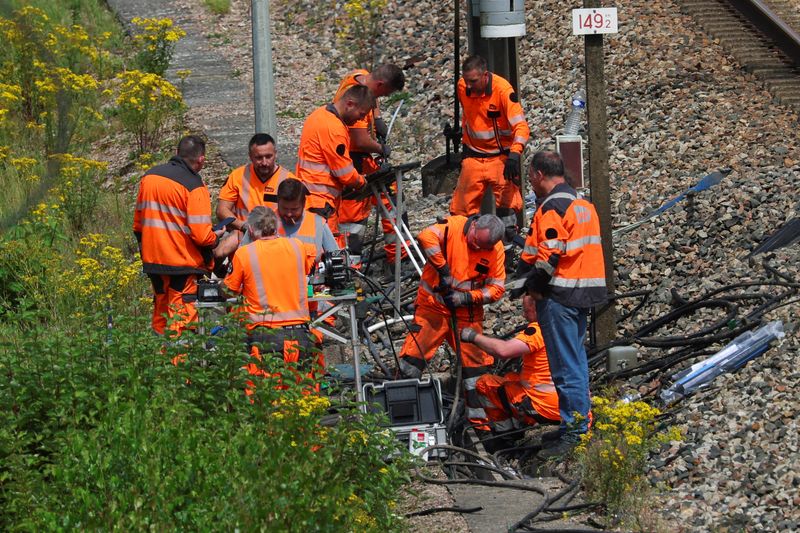PARIS (Reuters) - Unidentified saboteurs struck France's train network in a series of pre-dawn attacks across the country on Friday, causing travel chaos and exposing security gaps just hours before the opening ceremony of the Paris Olympics.
What do we know about the attacks?
THE ATTACKS
Explosive devices set off fires on signalling infrastructure on three railway lines going into Paris, rail operator SNCF said. The attacks hit the lines from cities such as Lille in the north, Bordeaux in the west and Strasbourg in the east.
Another attack on the Paris-Marseille line was foiled.
One attack happened by lines near Courtalain, southwest of Paris, another in Pagny-sur-Moselle in northeast France and the other in Croisilles near the Belgian border.
Pictures released by SNCF showed engineers repairing charred cables in signal substations.
THE PERPETRATORS
Nobody has claimed responsibility for the attacks and France's Prime Minister Gabriel Attal said it was too early to speculate about who might be behind them. Two security sources told Reuters that the mode of attack meant initial suspicions fell on leftist militants or environmental activists, but cautioned they did not yet have any evidence.
The Paris prosecutor's office said an investigation would be overseen by its organised crime office, with the anti-terrorist sub-directorate (SDAT), a branch of the judicial police that typically monitors far-left, far-right and radical environmental groups, coordinating investigations.
NATO Secretary-General Jens Stoltenberg said in June that the alliance had seen several examples of "sabotage, of arson attempts" by Russia, but there is no indication that Moscow might have been behind Friday's attacks in France.
THE IMPACT
The attacks marked an inauspicious start to the Olympic Games as France prepares to stage one of the most ambitious Opening Ceremonies ever seen.
Some 45,000 police, 10,000 soldiers and 2,000 private security agents have been deployed to secure the Games' opening ceremony. Snipers will be on rooftops, and drones in the air. But while the capital is locked down for the opening ceremony, security elsewhere in the country is lighter.

SNCF chief Jean-Pierre Farandou said some 800,000 customers had been impacted ahead of a busy weekend for French holidaymakers.
Eurostar's high-speed services linking London and Paris were forced onto slower lines while Germany's Deutsche Bahn warned of disruption to long-distance services. The attacks will make it tougher for people heading to Paris from other areas of France.